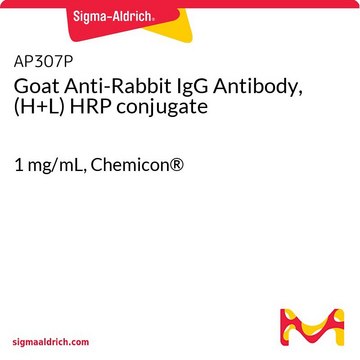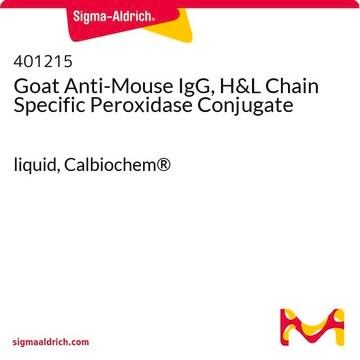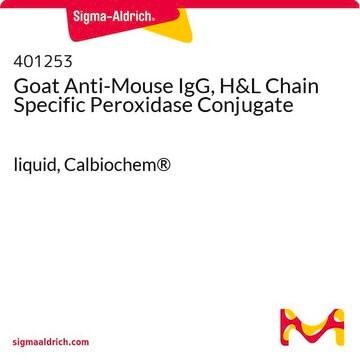401353
Goat Anti-Rabbit IgG, H & L Chain Specific Peroxidase Conjugate
liquid, Calbiochem®
Sign Into View Organizational & Contract Pricing
All Photos(1)
About This Item
UNSPSC Code:
12352203
NACRES:
NA.46
Recommended Products
biological source
goat
Quality Level
antibody form
affinity isolated antibody
antibody product type
secondary antibodies
clone
polyclonal
form
liquid
contains
0.02% Thimerosal as preservative
manufacturer/tradename
Calbiochem®
storage condition
do not freeze
isotype
IgG
shipped in
wet ice
storage temp.
2-8°C
target post-translational modification
unmodified
General description
Adsorbed against bovine, horse, and human serum proteins.
Immunoaffinity purified goat polyclonal antibody adsorbed against normal human, bovine, and horse serum proteins and conjugated to horseradish peroxidase (HRP). Recognizes rabbit IgG, heavy and light chains.
This Goat Anti-Rabbit IgG, H & L Chain Specific Peroxidase Conjugate is validated for use in Enzyme Immunoassay, Immunoelectrophoresis for the detection of Rabbit IgG, H & L Chain Specific.
Application
Enzyme Immunoassay (1:10,000)
Immunoelectrophoresis (see comments)
Immunoelectrophoresis (see comments)
Warning
Toxicity: Standard Handling (A)
Physical form
In 10 mM PBS, 0.5 mM EDTA, 10% mannose, 2% sucrose, 1% BSA, pH 7.6.
Other Notes
Specificity for rabbit IgG, heavy and light chains, determined by ELISA against normal rabbit serum. Cross-reactivity with normal bovine, horse, and human sera is <2% by direct solid phase immunoassay. Variables associated with assay conditions will dictate the proper working dilution.
Legal Information
CALBIOCHEM is a registered trademark of Merck KGaA, Darmstadt, Germany
Disclaimer
To comply with ban of sale of mercury-added products required by The Interstate Mercury Education and Reduction Clearinghouse (IMERC), this product is prohibited to be sold in the following US states: Rhode Island and Connecticut.
Not finding the right product?
Try our Product Selector Tool.
Storage Class Code
12 - Non Combustible Liquids
WGK
WGK 2
Flash Point(F)
Not applicable
Flash Point(C)
Not applicable
Certificates of Analysis (COA)
Search for Certificates of Analysis (COA) by entering the products Lot/Batch Number. Lot and Batch Numbers can be found on a product’s label following the words ‘Lot’ or ‘Batch’.
Already Own This Product?
Find documentation for the products that you have recently purchased in the Document Library.
Min-Kyung Yeo et al.
Journal of Cancer, 8(16), 3371-3377 (2017-11-22)
Background: Protein kinase C zeta/lambda (PKCζ/λ) is a family of protein kinase enzymes that contributes to cell proliferation and regulation, which are important for cancer development. PKCζ/λ has been shown to be an important regulator of tumorigenesis in intestinal cancer.
Yoshifumi Kurosaki et al.
Journal of clinical laboratory analysis, 27(3), 231-236 (2013-02-27)
Apolipoprotein A-I (Apo A-I), the major component of high-density lipoprotein (HDL), is modified by reactive α-oxoaldehydes, such as methylglyoxal (MG) and glycolaldehyde (GA), and these modifications affect the function of Apo A-I. GA- and MG-modified Apo A-I serum levels were
Tina Schumann et al.
Communications biology, 4(1), 826-826 (2021-07-03)
Genome-wide association studies have identified SLC16A13 as a novel susceptibility gene for type 2 diabetes. The SLC16A13 gene encodes SLC16A13/MCT13, a member of the solute carrier 16 family of monocarboxylate transporters. Despite its potential importance to diabetes development, the physiological
Ulrich Hohmann et al.
The Plant cell, 32(10), 3311-3323 (2020-08-17)
Receptor kinases with extracellular leucine-rich repeat domains (LRR-RKs) form the largest group of membrane signaling proteins in plants. LRR-RKs can sense small molecule, peptide, or protein ligands and may be activated by ligand-induced interaction with a shape complementary SOMATIC EMBRYOGENESIS
Shuli Chen et al.
International journal of oncology, 52(2), 579-588 (2017-12-06)
Prostate cancer is initially sensitive to hormone therapy; however, over time the majority of patients progress to a hormone-insensitive form classified as castration-resistant prostate cancer (CRPC). CRPC is highly metastatic and patients have a poor prognosis. Thus, new drugs for
Our team of scientists has experience in all areas of research including Life Science, Material Science, Chemical Synthesis, Chromatography, Analytical and many others.
Contact Technical Service








